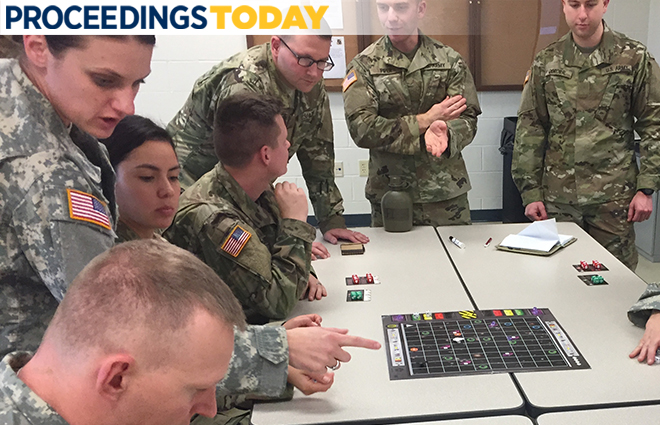
Leaders are often at a loss to find successful team-building exercises, frequently falling back on stereotypical team sports or costly outside facilitators. Many modern board games offer an opportunity for team-based and cooperative play that can provide surprisingly innovative team-building. Unlike tired old family standbys such as “Monopoly,” “Clue,” or “Sorry,” these more recent games are tailor-made to be more challenging, more cerebral, and more likely to encourage repeat play. Furthermore, these games can help your team develop transferable skills—performing complex tasks while stressed, anticipatory planning, and interpersonal communications. A class of Illinois Army National Guard officer candidates recently tested the value of such games by playing the science-fiction game “Space Cadets: Dice Duel” by Stronghold Games as part of a weekend activity and found it valuable.
Space Cadets allows two teams, made up of two to four players per team, to take the role of various bridge crewmembers on a starship. The players are assigned to one or more roles (in which they remain throughout), operating the various systems of their ship. “Engineering” provides power to the other bridge positions. “Helm” maneuvers the ship. “Weapons” prepares and fires torpedoes at the enemy. “Sensors,” “Shields,” and “Tractor Beam” have duties as well. One player acts as captain, managing the great mess that develops against another team of players on a similar enemy ship.
The goal of the game is to maneuver a model of a spaceship on the game board, collecting crystals, avoiding collisions with astronomical bodies, and destroying the enemy. Players roll customized dice for each duty station to perform their functions—if their station has power. For example, the helm station has dice with symbols indicating various combinations of forward movement for one or two spaces, coming about, and turns to port or starboard. While powered, the helmsman may roll the helm dice and set aside those maneuvers that fulfill the captain’s orders. The other stations also have custom dice tailor-made for their particular functions.
All of this takes place without the benefit of discrete turns. The captain keeps things moving by directing the movement of energy from engineering to the various departments. All the while, the enemy team is doing the same thing. Commands are issued and countermanded. The departments scream that they need more power. Everyone is rolling dice like madmen at a craps table, looking for the right combination of symbols that will load a torpedo tube or raise a shield or move the ship to just the right spot to fire on the enemy. Meanwhile, the teams steal glances across the table to see what the enemy is doing. It is stressful, barely controlled chaos.
Most modern board games have a tutorial video available online, which turned out to be a necessary tool when my class of officer candidates tried out “Space Cadets.” The video allowed each team to learn the basic rules of the game in a logical and regimented fashion. A single game lasts 30 to 45 minutes (according to the instructions), but the first session took longer as the players needed some time to grasp the rules and flow of the game. The stress of not being able to do quite everything players want compresses time as brains pump various neurotransmitter chemicals in an effort to heighten senses and sharpen thinking.
The game is obviously not nearly as taxing as actually running a combat vehicle and its crew, but the advantages of “Space Cadets” (or similar games) as part of a team-building exercise are manifold. The interpersonal communication necessary to succeed in the game is not too far from that needed in vehicle operations. For example, learning how to tell your driver exactly where to place a vehicle is similar to telling the helmsman where to “fly” the ship in the game. Of course, this is complicated by the dice interface, as directions on the maneuver dice are relative to the orientation of the ship model on the board.
In addition, managing the power requirements of the ship in the game is fluid and constant. Except when combat begins or the tractor beam is activated, both teams continuously roll dice, ready systems, and maneuver. Being able to think and make decisions on the fly about immediate needs while looking forward to the next requirement (and the one after that) is definitely a handy skill to develop before it is needed in the real world.
The short duration of each game makes it possible to play multiple times in quick succession. This could allow squad or platoon leaders to juggle crew members to see how they interact in different combinations. (It also would allow the crews themselves to see how they interact in various situations.)
At the end of the session, I recommend a solid after-action review (AAR) to gauge how well or how poorly the team performed and how they perceived the training. Additionally, the AAR could serve to identify best practices in the game and discuss any that have a direct correlation to operating in the real world.
The ability to manage coolly and calmly the various systems of modern combat is a valuable skill. Outside of expensive training time (and its associated maintenance costs), there are few opportunities to train on what is essentially high-stress multitasking. While a board game is no substitute for getting in a combat vehicle and putting it and its crew through their paces, the mental and emotional stress of a game such as “Space Cadets: Dice Duel” can be an interesting addition to a junior leader’s training toolkit.
Sergeant First Class Arnold is an Illinois Army National Guard Officer Candidate School instructor. He has deployed to Bosnia and Afghanistan, where he was a mentor to an Afghan National Army Battalion. He hosts The Veteran Wargamer podcast, available online.
For more great Proceedings content, click here.


